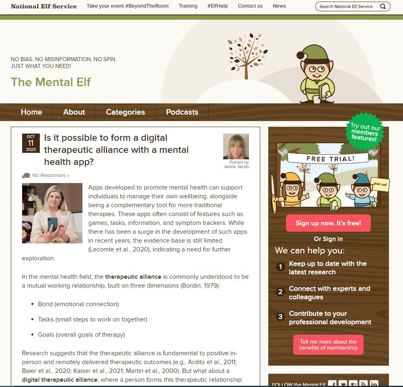Is it possible to form a digital therapeutic alliance with a mental health app?
Our Co-Research lead Jenna Jacob wrote a blog for the Mental Elf on 11 October 2023:
Apps developed to promote mental health can support individuals to manage their own wellbeing, alongside being a complementary tool for more traditional therapies. Research suggests that the therapeutic alliance is fundamental to positive in-person and remotely delivered therapeutic outcomes (e.g., Ardito et al., 2011; Baier et al., 2020; Kaiser et al., 2021; Martin et al., 2000). But what about a digital therapeutic alliance, where a person forms this therapeutic relationship with an app that has no human support?
Overall, research exploring people’s capacity to develop bonds with apps has seen mixed results (Tong et al 2022). So, what does it mean to build a digital therapeutic alliance with an app? Tong and colleagues (2023) aimed to explore the dimensions of the digital therapeutic alliance with fully automated apps through a qualitative lens.
The authors generated five themes:
-
Valuing flexibility
-
The role of accountability
-
The importance of emotional experiences for connections
-
Enhanced openness
-
Lack of agreement upon goals
Tong et al. (2023) concluded that this area is under-researched, and that their study offers the first qualitative exploration of the dimensions of the digital therapeutic alliance with fully automated mental health apps. The authors emphasised that the study aimed to conceptualise the digital therapeutic alliance, and that it can "be built through users’ accountability, openness to apps, emotional experiences and connections with apps, and flexible interactions with apps."
Please see the full blog for Jenna’s reflections on this research, including implications for practice here.

References
Primary paper
Tong, F., Lederman, R., D’Alfonso, S., Berry, K., & Bucci, S. (2023). Conceptualizing the digital therapeutic alliance in the context of fully automated mental health apps: A thematic analysis. Clinical Psychology & Psychotherapy.
Other references
Ardito, R. B., & Rabellino, D. (2011). Therapeutic alliance and outcome of psychotherapy: historical excursus, measurements, and prospects for research. Frontiers in Psychology, 2, 270.
Baier, A. L., Kline, A. C., & Feeny, N. C. (2020). Therapeutic alliance as a mediator of change: A systematic review and evaluation of research. Clinical Psychology Review, 82, 101921.
Kaiser, J., Hanschmidt, F., & Kersting, A. (2021). The association between therapeutic alliance and outcome in internet-based psychological interventions: a meta-analysis. Computers in Human Behavior, 114, 106512.
Martin, D. J., Garske, J. P., & Davis, M. K. (2000). Relation of the therapeutic alliance with outcome and other variables: a meta-analytic review. Journal of consulting and clinical psychology, 68(3), 438.
Tong, F., Lederman, R., D’Alfonso, S., Berry, K., & Bucci, S. (2022). Digital therapeutic alliance with fully automated mental health smartphone apps: A narrative review. Frontiers in Psychiatry, 13, 819623.